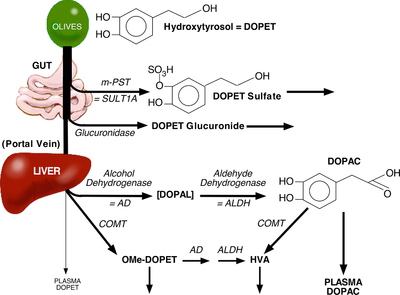Author: Nina Isoherranen, PhD on November 01, 2017 
Eating olives has been implicated with a plethora of health benefits including cardiovascular benefits, cancer prevention, antioxidant effects, and many others. In addition to being found in martinis, olives are an important component of the Mediterranean diet. In fact, the catechol dihydroxyphenylethanol (DOPET), which is abundant in olives, has been identified as a nutraceutical and proposed to contribute to these Mediterranean diet health benefits. DOPET has also been shown to have neuroprotective effects in model systems.
In the article “Plasma Catechols After Eating Olives” published in Clinical and Translational Science in September 2017,the authors show, however, that after the consumption of ten olives the increase in circulating concentrations of DOPET is relatively minor, despite the significant amount of DOPET present in in olives. Instead, the plasma concentrations of 3,4-dihydroxyphenylacetic acid (DOPAC), which is not present in significant amounts in olives but is a catecholamine metabolite of DOPET, increased significantly (a peak 37-fold increase in plasma DOPAC). The authors suggest that this is most likely due to significant first-pass metabolism of DOPET to DOPAC in the liver.
This is disappointing for martini drinkers (and many others who consume olive oil and olives), as the results suggest that oral administration or consumption of DOPET will not provide sufficient systemic exposure to DOPET to gain health benefits. Instead, the three olives found in a martini would result in a peak 11-fold increase in plasma DOPAC, assuming a linear dose-exposure relationship for the number of olives consumed and the increase in plasma catechols. This is, of course, assuming that the alcohol in the gin and vermouth does not alter the bioavailability of DOPET or the metabolism of DOPET to DOPAC by alcohol and aldehyde dehydrogenases. This assumption might, in the end, not hold true as alcohol has been shown to increase urinary excretion of DOPET and the metabolism of endogenous DA, possibly increasing the bioavailability and exposure to DOPET.
Notably though, this article shows that even minor, common changes in diet may significantly alter plasma catechols affecting clinical measurements.
Image by Goldstein, et al. Clin. Trans. Sci., doi: 10.1111/cts.12489, is licensed under CC BY-NC 4.0. ©2017 The authors.

The comment feature is locked by administrator.